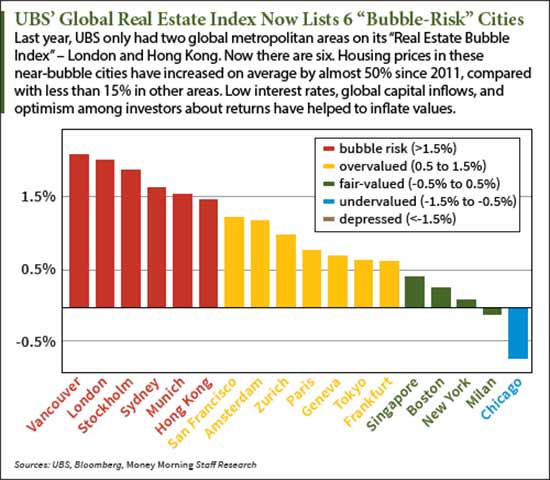 About one year ago - in October 2015 - UBS Group AG (NYSE: UBS) took stock of the world's most expensive real estate markets for the first time.
About one year ago - in October 2015 - UBS Group AG (NYSE: UBS) took stock of the world's most expensive real estate markets for the first time.
The firm found that London and Hong Kong were the only two cities exposed to housing bubble risk.
In 2016, however, that's drastically changed...
There are now six "bubble-risk" cities worldwide.
6 Cities in a Dangerous Housing Bubble
At the top of UBS' list is Vancouver, Canada. Housing prices there have more than doubled in the past decade - and have risen 25% since 2014 alone.
In Vancouver, the typical detached single-family house in August was $1.21 million on average, according to the Real Estate Board of Greater Vancouver. That same month - on Aug. 2 - the British Columbia provincial government imposed a 15% tax on foreign buyers in an attempt to cool prices down.
The governments of other inflated cities worldwide are considering doing the same.
Don't Miss: Are you doing everything you can to grow your retirement "nest egg"? You can start today with our top 5 money-making investment reports - they're absolutely free...
Here are the other five metropolitan areas on the verge of a housing bubble and a subsequent burst:
- London, England
- Stockholm, Sweden
- Sydney, Australia
- Munich, Germany
- Hong Kong - which is technically an autonomous territory, or sovereign state, within China

Home prices in all of these at-risk cities have jumped by nearly 50% on average since 2011.
This is compared to other major cities across the globe that have typically seen real estate prices increase by about 15% or less since 2011.
UBS' report concluded that there are several factors responsible for these housing market overvaluations. Here's a look what's to blame...
What's to Blame for the Worldwide Housing Bubble?
[mmpazkzone name="in-story" network="9794" site="307044" id="137008" type="4"]
In so many words, the UBS report essentially pointed its finger directly at loose monetary policy initiated by the world's central banks. For example, low interest rates maintained by the European Central Bank (ECB) have pushed investors to hunt for returns in tangible assets, "so it is hardly any wonder that housing markets are again overheating," said the report's two authors, Claudio Saputelli and Matthias Holzhey, according to Bloomberg yesterday (Sept. 27).
Must Read: Will the Fed Create a Stock Market Crash?
Furthermore, investors are searching for yield in these low-interest-rate environments, which pushes capital into real estate assets both in residential and commercial regions.
These low rates make for slim pickings in most investing arenas, writes Peter Krauth, Money Morning's Resource Specialist - a 20-year veteran of the resource market.
But not in real estate.
"After the purge of the 2008-2009 financial crisis," Krauth explains, "real estate has made a forceful and convincing comeback."
Alongside this comeback came investor optimism associated with the global real estate boom. Housing is one of the biggest drivers of economic recovery and stability. A home is usually the single largest purchase that an individual or couple makes in their lifetime. So home-buying bouts indicate that a region is, at that moment, economically steady.
But too much home buying - and at too fast a clip - indicates a bubble, because it means real estate prices are rising too fast to an unaffordable level.
After which the bubble bursts.
UBS' report did not specify when the six at-risk cities will experience a housing market collapse; it only pointed out that they are, as of right now, each headed in that direction.
And while no U.S. cities made UBS' bubble-risk list, one city came awfully close...
San Francisco.
Frisco was No. 6 on UBS' list. The median cost of a home there currently averages out to around $1.2 million. Home prices have risen just under 50% there since 2011.
Perhaps we'll see the California city on UBS' list next year ...
Up Next
U.S. home sales and home prices rose in 2015, but homebuilders' stocks didn't follow suit.
So what happens next to homebuilders depends on whether the trends that lifted both prices and sales since 2009 are about to hit a wall.
Because the wider housing sector itself could be headed for trouble.
Follow us on Twitter @moneymorning and on Facebook.
Related Articles:


